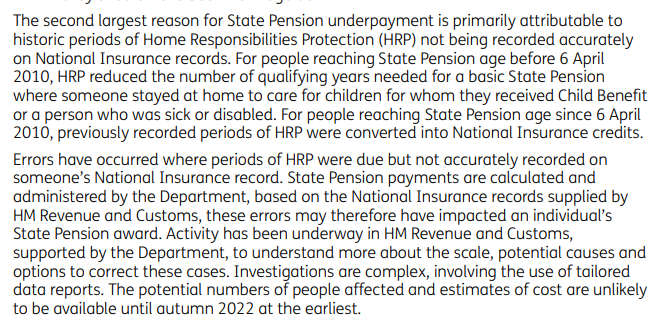Time for Government to end ‘radio silence’ over state pension error causing ‘mothers to miss out on millions' – Steve Webb, LCP
Pensions & benefits Impact Personal finance
In its latest annual report, published in July 2022, DWP admitted that a new error had been identified in state pension payments, relating to a system previously known as ‘Home Responsibilities Protection’ (HRP). HRP was a process introduced in 1978 which was designed to protect parents – mainly mothers – who spent time at home with children and might otherwise have missed out on valuable state pension rights.
In its July report, DWP said it was working with HMRC to assess the scale of the error, but so far there has been no public statement either on the scale of the problem nor on plans to check cases and put things right.
In response, consultants LCP launched a ‘mothers missing millions’ campaign alongside a website which explains the rules and allows people to check if they might be affected (see: www.lcp.uk.com/mothersmissingmillions ). The site has already had tens of thousands of visits and the firm is now starting to hear from people who have successfully secured a higher pension and a backdated lump sum as a result of the campaign.
This includes one case where an elderly widower was able to put in a posthumous claim for his late wife’s missing HRP and has just received a lump sum of over £4,000. In another case a woman had a £50 per week state pension uplift which could have cost her £50,000 over the course of her retirement if the error had not been detected.
The key features of the system are:
- From 1978-79 until 2009-10, a person receiving child benefit for a child under 16 could be awarded a year of Home Responsibilities Protection (HRP), provided they were not paying the reduced ‘married woman’s stamp’ at the time; each year of HRP reduced by one year the target needed for a full state pension; for example, a woman normally needed 39 years for a full state pension, but a woman with 10 years of HRP would only need 29 years of contributions for a full pension;
- From 2010-11 onwards, a person receiving child benefit for a child under 12 could receive a National Insurance credit for that year; unlike HRP, a National Insurance Credits counted as a full qualifying year towards state pension; women who had not reached pension age by 2010 had their past years of HRP ‘upgraded’ into full NI credits, and these should show as ‘full’ years on their NI record;
According to DWP, in some cases this process has not worked correctly and women are missing out on the credits or HRP that they are due. DWP describe this as the ‘second largest’ source of error in state pension payments.
The following are two case studies of people who have heard about the ‘mothers missing millions’ campaign and have secured enhanced payments as a result.
|
Case Study 1. Mrs Susan Burton – photo available on request
Mrs Burton started to draw her state pension in December last year. She was disappointed to be awarded just £123 per week, based on 23 qualifying years of NI contributions, around two thirds of the number needed for a full pension. When she read about the ‘mothers missing millions’ campaign she wondered if this might apply to her. When she checked, she was shocked to discover online that her National Insurance record was completely blank from 1975 to 1992.
|
|
Case Study 2 – Mr Frank Jones and his late wife Mary
This information was then passed to DWP who accepted that Mrs Jones had been underpaid. DWP have contacted Mr Jones to say that his late wife was underpaid by £4,152, and that this sum will now be paid to him as her next-of-kin. DWP informed him that such arrears are payable to next-of-kin, including children, where appropriate, when the qualifying pensioner has died.’ [Note: For this case study only, names have been changed at the family’s request] |
Commenting, Steve Webb, partner at LCP, said:
“There is no doubt in my mind that many thousands of mothers have been underpaid state pensions, including some who are now no longer with us. The errors arise from a failure to correctly reflect the protection which is built into the system for time spent bringing up children. Yet again, a state pension error has been unearthed which disproportionately affects women. Whilst it is satisfying to be able to help individuals get their pension records corrected, what is really needed is concerted government action to fix this problem. But so far we have had ‘radio silence’ from the Government. DWP and HMRC have clearly known for many months that there is a problem and it is now time for them to tell us how many people are affected and, more importantly, how they plan to put things right’.
** ENDS **
Notes to editors:
- The LCP website which explains the rules, how people can check, and what forms people need to fill in, can be found at: www.lcp.uk.com/mothersmissingmillions
- The DWP annual report for 2021/22, published in July 2022 included the following (p71):

(Source: Annual Report and Accounts 2021-22 (publishing.service.gov.uk))
- A photograph of Mrs Burton is available on request. For the second case study, names have been changed.
